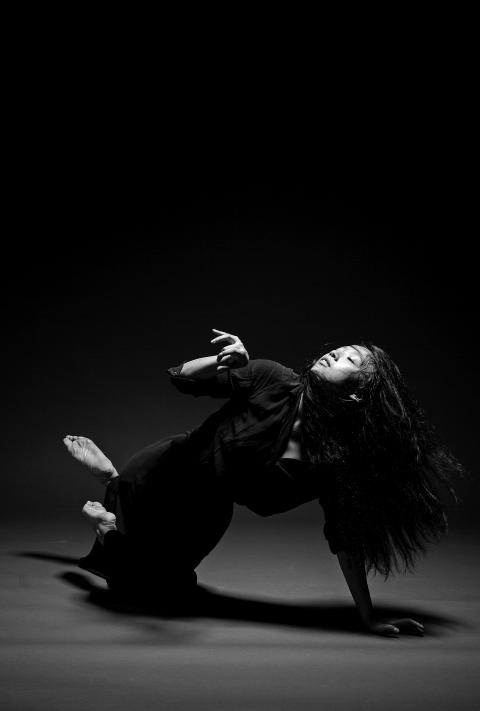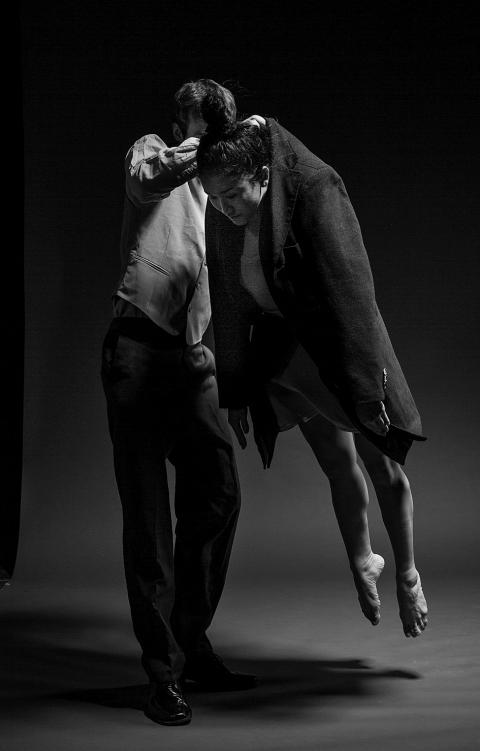This was a year of standout performances by young male choreographers, two females and some older hands, showing there is a lot of up and coming Taiwanese artists and experienced ones to reinvent themselves.
It was also a year that proved that the most surprising and memorable shows could appear when you least expect it.
‘GARDENIA’ AND ‘MAATAW’

Photo: Courtesy of Terry Lin
The year got off to a blooming start with Wu Chien-wei’s (吳建緯) Gardenia (六出) at Taipei’s Wellspring Theater for his Tussock Dance Theater (野草舞蹈聚落). Wu created a smart, intriguing duet with Cheng Hao (鄭皓) that got an extra kick from costumes by London-based Taiwanese fashion designer Johan Ku (古又文).
The Formosa Indigenous Dance Foundation of Culture and Arts (原住民族樂舞劇) took a swing at vested interests in its January production of Maataw: the Floating Island (浮島) at the National Theater, a powerful indictment of the government’s exploitation of the Tao of Orchid Island (Lanyu, 蘭嶼) that also highlighted the callous disregard and disrespect shown by the ever-growing number of tourists toward the the island’s residents.
The company was able to tour Maataw to Aboriginal communities nationwide over several months, but given the Council of Indigenous Peoples’ reported dislike of the strongly political work, one cannot help buy wonder if the council will as generous toward future works by the troupe.

Photo: Courtesy of Terry Lin
TONGUES ARE WAGGING
Cloud Gate 2’s (雲門2) artistic director Cheng Tsung-lung’s (鄭宗龍) 13 Tongues (十三聲) in March at the National Theater found him pushing through his usual comfort zone in terms of a longer length (70 minutes) and a move away from abstract works to a more personal one, based on memories of his childhood in Taipei’s Wanhua District (萬華).
Audiences might have been worried about their comfort level heading into the Cloud Gate Theater for Liu Kuan-hsiang’s (劉冠詳) Kids(我知道的太多了) in May, which was about his terminally ill mother’s final months and his interactions with her.
However, the piece, produced by the Horse troupe (驫舞劇場) and featuring Liu’s wife, Chien Ching-ying (簡晶瀅), as well as Lin Yu-ju (林祐如), turned out to be a powerfully touching work that was ultimately uplifting.
It also helped put Liu on Cloud Gate Dance Theatre’s (雲門舞集) radar, and he has been tapped to create a piece for Cloud Gate 2’s Spring Riot next year.
It was great to see Europe-based Lee Chen-wei’s (李貞葳) Together Alone (孤單在一起), at the beginning of June. The duet with Hungarian dancer and actor Vakulya Zoltan for the National Theater Concert Hall’s “Innovation Series” reinforced the reputation Lee has created with her solos in recent years for Ho Hsiao-mei’s (何曉玫) Meimage Dance Company’s New Choreographer Project.
STANDOUT PERFORMANCE
The standout performance in this year’s New Choreographer Project was by Germany-based Tien Tsai-wei (田采薇), a member of Tanztheater Wuppertal Pina Bausch, a duet with German dancer Jan Moellmer titled, The Man.
I have long been a fan of Bulareyaung (Bula) Pagarlava’s work, whether for Cloud Gate, Cloud Gate 2 or other troupes, but Colors (漂亮漂亮) for his Bulareyaung Dance Company (布拉瑞揚舞團) at the Cloud Gate Theater in October was a delight from start to finish.
Lighting/stage designer Li Chien-chang (李建常) and Bula were able to evoke the blues of Taitung’s sky and seashore and the sounds of the ocean with creative lighting and several large blue and white striped plastic tarps, while Bula’s choreography brought out the best in his dancers.
The Taipei National University of the Arts’ Dance Department’s annual Winter Dance Concert showed why its students, alumni and faculty continue to dominate Taiwan’s dance world.
‘ALTERNATE REALM’
While department chairman Zhang Xiaoxiong (張曉雄) has created a long list of solid works, and his Guang Ling Verse (廣陵散) was a gorgeous, complicated piece for 10 male dancers set to guqin (古琴) music that was mesmerizing to watch, it was young (26) choreography student Chang Kuo-wei’s (張國韋) Alternate Realm (鏡界) that proved to be the highlight of the show.
Chang blended hip-hop moves with contemporary technique and choreographed the movements of six large mirrors to create a multi-layered piece that was visually captivating and artistically challenging for its all-male cast.
This year was also memorable – on a sadder note – for the retirement from the repertoire of two beloved Lin Hwai-min (林懷民) works for Cloud Gate, 1994’s Songs of the Wanderers (流浪者之歌), and the classic Moon Water (水月) from 1988.
While Lin and company members insist the retirement is not permanent, any talk of returning the two to the line-up appears to be several years away.

A vaccine to fight dementia? It turns out there may already be one — shots that prevent painful shingles also appear to protect aging brains. A new study found shingles vaccination cut older adults’ risk of developing dementia over the next seven years by 20 percent. The research, published Wednesday in the journal Nature, is part of growing understanding about how many factors influence brain health as we age — and what we can do about it. “It’s a very robust finding,” said lead researcher Pascal Geldsetzer of Stanford University. And “women seem to benefit more,” important as they’re at higher risk of

Eric Finkelstein is a world record junkie. The American’s Guinness World Records include the largest flag mosaic made from table tennis balls, the longest table tennis serve and eating at the most Michelin-starred restaurants in 24 hours in New York. Many would probably share the opinion of Finkelstein’s sister when talking about his records: “You’re a lunatic.” But that’s not stopping him from his next big feat, and this time he is teaming up with his wife, Taiwanese native Jackie Cheng (鄭佳祺): visit and purchase a

Experts say that the devastating earthquake in Myanmar on Friday was likely the strongest to hit the country in decades, with disaster modeling suggesting thousands could be dead. Automatic assessments from the US Geological Survey (USGS) said the shallow 7.7-magnitude quake northwest of the central Myanmar city of Sagaing triggered a red alert for shaking-related fatalities and economic losses. “High casualties and extensive damage are probable and the disaster is likely widespread,” it said, locating the epicentre near the central Myanmar city of Mandalay, home to more than a million people. Myanmar’s ruling junta said on Saturday morning that the number killed had

Mother Nature gives and Mother Nature takes away. When it comes to scenic beauty, Hualien was dealt a winning hand. But one year ago today, a 7.2-magnitude earthquake wrecked the county’s number-one tourist attraction, Taroko Gorge in Taroko National Park. Then, in the second half of last year, two typhoons inflicted further damage and disruption. Not surprisingly, for Hualien’s tourist-focused businesses, the twelve months since the earthquake have been more than dismal. Among those who experienced a precipitous drop in customer count are Sofia Chiu (邱心怡) and Monica Lin (林宸伶), co-founders of Karenko Kitchen, which they describe as a space where they